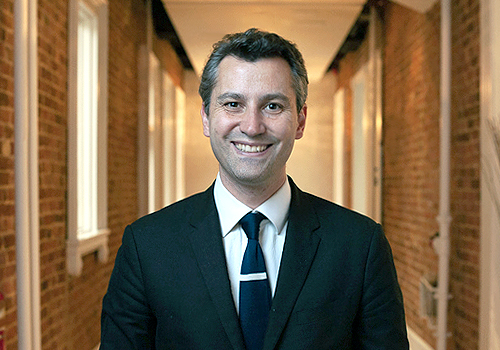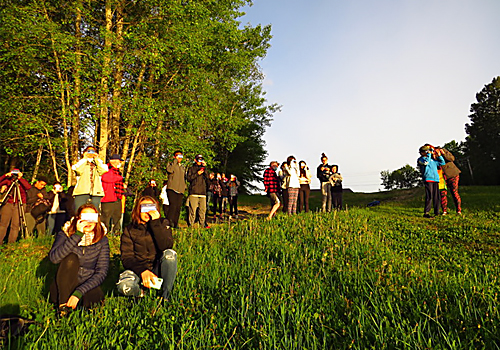The Trottier Family Foundation is partnering with Arts & Science to ensure thousands of Canadian children can view the upcoming total solar eclipse safely.
An impactful gift of $240,000 from the foundation will help fund Eyes to the Sky: Elevating Astronomy Education in Canada. The initiative is a joint effort by the Dunlap Institute for Astronomy & Astrophysics and partner Discover the Universe.
The total eclipse will be visible over Central and Eastern Canada on April 8, 2024.
“The eclipse will happen right as kids are getting out of school,” says Discover the Universe founder Julie Bolduc-Duval. “In my childhood, they kept us inside during an eclipse because we didn’t have the resources to facilitate a safe viewing, but that’s something we simply don’t want to repeat in 2024 if we can help it.”

In addition to outreach and education supported by the Trottier Family Foundation, the shining star of this project is a mission to procure and distribute 250,000 pairs of eclipse viewing glasses to students and teachers.
The eclipse's alignment with the school day adds more urgency to distribute as many eclipse viewers as possible, says Bolduc-Duval, recalling an incident years ago involving fake eclipse viewers sold online, “A total solar eclipse is a once-in-a-lifetime opportunity,” she says. “We’re going to prepare schools, and this gift from the Trottier Family Foundation will help us maximize our reach.”
The Trottier Family Foundation’s gift will also empower Indigenous astronomers.
“In deepening our relationships with northern partners in recent years, we recognize that simply adapting educational materials to northern latitudes while keeping all reference to western knowledge is not aligned with the spirit of reconciliation,” says Bolduc-Duval.
Innu astrophysicist and incoming Dunlap faculty member Laurie Rousseau-Nepton has been working with U of T and Discover the Universe for several years, notably helping dozens of Indigenous communities participate in the 2021 eclipse. She will do the same in 2024.
“If you’re exposing kids to science, money shouldn’t matter,” says Rousseau-Nepton, thanking the Trottier Family Foundation for helping put kits and viewers in classrooms at no cost to teachers and school boards.
“It’s the perfect reason to get everyone looking at the sky together and observing this phenomenon that doesn’t happen very often,” she says. “It’s a great way to connect people.”

Major Canadian cities along the eclipse’s path of totality include Hamilton and Montreal. People on U of T’s three campuses will also enjoy a tremendous — although slightly incomplete — view of the solar phenomenon.
Science education champion and Dunlap Director Bryan Gaensler says preparation for next year is key because another total eclipse won’t be visible in or near Toronto until 2144.
“I’m incredibly grateful for the Trottier Family Foundation’s support, and it’s clear they have similar values to us,” says Gaensler. “We've had a lot of success with this foundation on other eclipse projects, but we knew we had to go even bigger this time.”
“We are always striving to advance fundamental research in the physical sciences and STEM,” says Trottier Family Foundation Executive Director Éric St-Pierre. “Eyes to the Sky reflects the beliefs and values of our founders. We are proud to be part of this initiative which harnesses the inherent importance of scientific discovery that can transform lives and benefit society.”
Even if this effort by U of T and the Trottier Family Foundation for this total solar eclipse only has a profound impact on just a handful of students, astronomers like Gaensler say it will be worth it.
“It’s not our goal for everyone to become an astronomer, but we want people to be in awe and humbled by the power of science,” he says. “You never know what endeavours it might inspire someone to pursue years from now.”
Interested in creating transformative opportunities for youth to participate in Eclipse 2024? Contact Emily Wilson, Associate Director, Development at emily.wilson@utoronto.ca or 416-978-4177.

